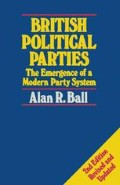Abstract
After winning the narrow electoral victory of 1964, the Labour Party held power for eleven of the next fifteen years before its heavy defeat in May 1979. They were troublesome years for the party and culminated in a series of the most damaging internal crises that the party has had to face in its history. The causes of these internal conflicts were many and complex, but the events of the 1960s and 1970s, together with the party’s policies and power relationship of leaders and led, were to play significant roles.
Preview
Unable to display preview. Download preview PDF.
Notes to Chapter 11
See Joe Haines, The Politics of Power (London: Jonathan Cape, rev. edn, 1977) pp. 220–21.
L. Minkin, The Labour Party Conference, rev. end (Manchester University Press, 1980) p. 316.
R. Crossman, The Diaries of a Cabinet Minister, 1964–66, vol. 1 (London: Hamilton/Jonathan Cape, 1975) p. 596.
Also A. Fenley, ‘Labour and Trade Unions’, in The Labour Party, C. Cook and I. Taylor (eds) (London: Longman, 1980) pp. 50–83.
Also C. Crouch, ‘The Peculiar Relationship: the Party and the Unions’, in The Politics of the Labour Party, D. Kavanagh (ed) (London: Allen & Unwin, 1982) pp. 171–90.
See D. Butler and D. Kavanagh, The British General Election of 1983 (London: Macmillan, 1984) pp. 295–7;
P. Whiteley, The Labour Party in Crisis (London: Methun, 1983) pp. 208–219;
A. Heath et al., How Britain Votes (Oxford: Pergamon Press, 1985);
P. Dunleavy and C. T. Husbands, British Democracy at the Crossroads (London: Allen & Unwin, 1985).
See M. Pinto-Duschinsky, British Political Finance 1830–1980 (Washington: American Enterprise Institute, 1980) pp. 155–78;
D. Butler and G. Butler, British Political Facts 1900–1985 (London: Macmillan, 1986) p. 157.
There is a detailed analysis of the problem in Whiteley, The Labour Party in Crisis, pp. 53–80; see also B. Hindess, ‘The Decline of Working Class Politics: A Re-Appraisal’, in Trade Unions in British Politics, B. Pimlott and C. Cook (eds) (London: Longman, 1982) pp. 237–57.
See D. Taverne, The Future of the Left (London: Cape, 1974).
See P. McCormack, Enemies of Democracy (London: Temple Smith, 1978) for an account by one of the anti-left Oxford infiltrators.
See also A. Young, The Re-selection of MPs (London: Heinemann, 1983).
The selection of Peter Tatchell in Bermondsey and the opposition of the former MP Mellish, also received a great deal of unsavoury publicity in February 1983, see P. Tatchell, The Battle for Bermondsey (London: Heretic Books, 1983).
See M. Crick, Militant (London: Faber & Faber, 1984);
T. Forrester, ‘The Labour Party’s Militant Moles’ New Society, 10 January 1980, pp. 52–4;
P. Wintour, ‘Militant’s Resolutionary Socialism’, New Statesman, 18 January 1980, pp. 77–8.
See M. Hatfield, The House the Left Built (London: Gollancz, 1978);
S. Holland, The Socialist Challenge (London: Quartet Books, 1975);
Tony Benn, Arguments for Socialism (London: Jonathan Cape, 1979).
Labour was the more popular of the parties in 1981 in spite of the formation of the SDP, but the Benn—Healey contest proved disastrous for Labour’s standing in the opinion polls, see D. Butler and G. Butler, British Political Facts, 1900–1985, p. 263.
See R. Rose, Do Parties Make a Difference? 2nd edn (London: Macmillan, 1984).
Author information
Authors and Affiliations
Copyright information
© 1987 Alan R. Ball
About this chapter
Cite this chapter
Ball, A.R. (1987). The Labour Party After 1964. In: British Political Parties. Palgrave, London. https://doi.org/10.1007/978-1-349-18725-6_13
Download citation
DOI: https://doi.org/10.1007/978-1-349-18725-6_13
Publisher Name: Palgrave, London
Print ISBN: 978-0-333-44502-0
Online ISBN: 978-1-349-18725-6
eBook Packages: Palgrave Political & Intern. Studies CollectionPolitical Science and International Studies (R0)

